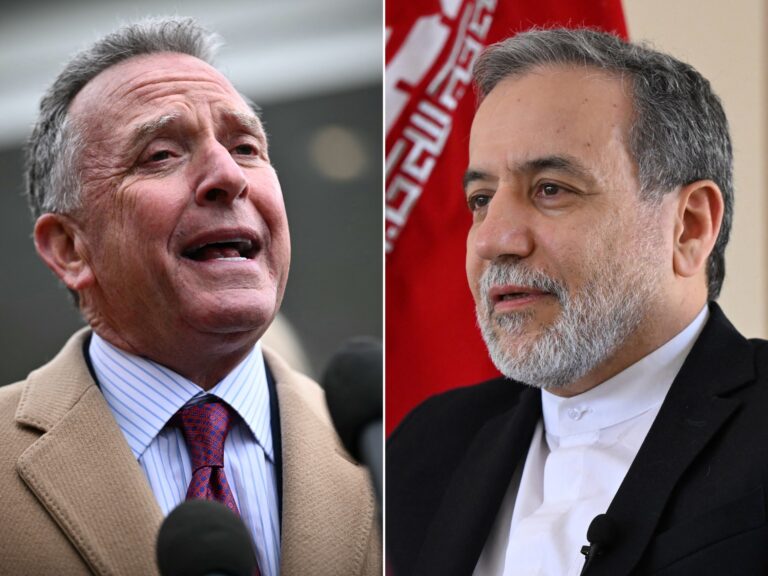Tehran, Iran – Delegates from the United States and Iran are set to begin nuclear negotiations in the Omani capital, Muscat, as US President Donald Trump again warned Tehran of military action if a deal is not reached.
“I want them not to have a nuclear weapon. I want Iran to be a wonderful, great, happy country, but they can’t have a nuclear weapon,” Trump told reporters on board Air Force One on his way to Florida on Friday night.
White House press secretary Karoline Leavitt also reiterated a refrain favoured by the Trump administration, saying “there will be all hell to pay” if the president’s demands are not met.
“We’ve been very clear what Iran is never going to have a nuclear weapon, and I think that’s what led to this meeting,” US Secretary of State Marco Rubio said on Thursday.
US Special Envoy Steve Witkoff is heading the US delegation, while the Iranians are led by Foreign Minister Abbas Araghchi, who arrived in Oman on Saturday morning. He is accompanied by his deputy for political affairs Majid Takht-Ravanchi, deputy for international affairs Kazem Gharibabadi, and Ministry for Foreign Affairs spokesman Esmail Baghaei.
After meeting with the Omani Foreign Minister Minister Badr bin Hamad al-Busaidi in Muscat, Araghchi said Iran is looking to reach a “fair and dignified agreement” with the US.
“If there is enough will, we will make a decision about the timetable of the negotiations,” he said.
While Trump and his officials have insisted the talks will be “direct” and “in the same room”, Tehran has insisted the negotiations will be indirect.
Iran’s state television reported that Araghchi will not be taking any photo opportunities with Trump’s envoy Witkoff during the talks.
Oman’s Foreign Minister Badr Al Busaidi will act as chief mediator in the talks.
“Observers caution not to expect too much from this first meeting in Oman,” said James Bays, Al Jazeera’s diplomatic editor. “The important thing is that the talks don’t completely collapse and that a process can be started.”
‘Real and fair’ deal
Iran and its supreme leader, Ayatollah Ali Khamenei, have emphasised that the US cannot be trusted and Iran won’t sit down with US officials directly because Trump unilaterally withdrew from Iran’s 2015 nuclear deal with world powers in 2018 during his first term as president.
Ahead of the talks, a senior aide to Supreme Leader Khamenei said that Tehran is seeking a “real and fair” agreement with Washington.
“Far from putting up a show and merely talking in front of the cameras, Tehran is seeking a real and fair agreement, important and implementable proposals are ready,” Ali Shamkhani posted on X on Friday.
The 2015 accord put stringent limits on Iran’s enrichment of uranium, stockpiles of nuclear material, and research and development in exchange for lifting United Nations sanctions.
The US had imposed its harshest sanctions yet in the aftermath of reneging on the deal in 2018. Those sanctions were only exacerbated by Trump’s successor Joe Biden, dealing heavy blows to the economy and 90 million Iranians.
Iran’s currency continues to hover around all-time low rates as a result of external pressure and local mismanagement, but it briefly regained some lost ground last week after news of the Iran-US talks in Oman came out, showing market eagerness for a deal.
The European powers party to the 2015 accord, namely France, United Kingdom and Germany, have also been imposing sanctions on Iran, both due to its nuclear advances in the aftermath of Trump’s withdrawal and because of tensions over the Russia-Ukraine war.
The European Union on Friday said that there was “no alternative to diplomacy” while Germany urged both sides to reach a “diplomatic solution”.
China and Russia, the other signatories of the deal, have opposed Western efforts to pressure Iran through passing censure resolutions at the International Atomic Energy Agency (IAEA). They have forged closer political and military ties with Tehran.
Iran has warned it will abandon the Non-Proliferation Treaty (NPT) and expel all remaining IAEA nuclear inspectors if the Western powers make good on their threats.
Trump and his officials, along with top Israeli leaders, have repeatedly warned Iran will be extensively bombed if it fails to agree to their demands over its nuclear programme.
They have suggested main nuclear facilities, refineries and civilian infrastructure like power plants will be attacked in case negotiations fail.
On Thursday, Washington imposed additional sanctions on Iran, targeting its oil network and nuclear programme.
Israeli Prime Minister Benjamin Netanyahu has discussed with Trump the so-called “Libyan model” to deal with Iran’s nuclear programme, meaning he is seeking a full dismantlement and surrender of all nuclear capabilities.
But Tehran has remained defiant, arguing nuclear knowledge and development gained over decades cannot be bombed or destroyed.
It has maintained that its nuclear programme is strictly peaceful and for civilian use, like for power generation and manufacturing of radiopharmaceuticals, but senior officials have signalled the Iranian establishment could go for a bomb if facing an “existential threat”.
Iran’s army and the Islamic Revolutionary Guard Corps (IRGC) have also been holding large-scale exercises and testing a variety of defensive and offensive weapons in an attempt to signal strength and readiness for a prolonged conflict if necessary.

